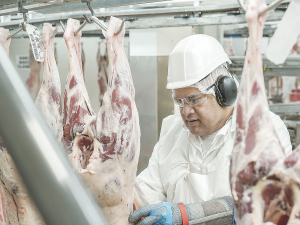BNZ: $10 milk price now unlikely for 2025/26 season
The chance of a $10-plus milk price for this season appears to be depleting.
 BNZ is predicting that farmgate prices for dairy and meat this season are likely to be lower compared to the year past.
BNZ is predicting that farmgate prices for dairy and meat this season are likely to be lower compared to the year past.
Farmgate prices for dairy and meat this season are likely to be lower compared to the year past, says BNZ senior economist Doug Steel.
He believes the slowing world demand for food will dominate other influences over this horizon, although many supply-side issues remain unresolved.
Writing in BNZ's latest Rural Wrap, Steel adds that confidence in any forecast in the current environment is low.
"There are simply too many very large factors in play to have strong conviction in how they will all evolve, how they might interact with each other, or when any material changes will occur.
"The progress of things like Covid and associated policies (particularly in China), Chinese growth more generally amid a softening property market, an aggressive tightening in global monetary conditions, supply-side bottlenecks including shipping costs, Russia weaponising gas supply to the EU, and war along with other geopolitical tensions, all have the potential to materially alter the outlook from base expectations."
Steel says this is a key reason why the bank has been generally cautious in its primary product price forecasts over recent times and remains so.
"It is as much an acknowledgement of uncertaint and risk as any firm view on the way ahead."
Steel notes that there is a lot more talk about the prospect of a global recession. He thinks rising concerns about the demand outlook are behind a material pullback in world commodity prices across a range of primary products.
For example, over the past few months, oil is down 20%, copper lower by 26%, aluminium off 33%, wheat down 31%, logs chopped 19%, dairy down 27%, beef reduced 15%, and lamb lower by 11%.
Steel adds that price levels are another matter and vary by product, but says the recent direction of change is clear.
"In addition to demand concerns, some of the global price slippage likely also reflects hints of easing in bottlenecks and blockages, along with indicators showing shipping costs retreating - at least to some degree, on some routes - from extreme highs."
He says this raises the prospect of some transport cost relief locally in time.
"There are even early signs that some parts of cost inflation are peaking too.
"But, even if overall cost inflation fell to zero today (little chance - look at the labour market for one), it would still leave levels higher than previously and margins pressured if product prices continue to ease back."
Steel says all overseas markets suggest a general pullback in primary product prices over recent months.
He notes that many global prices are denominated in US dollars. This means some of the price declines noted above will reflect a stronger US dollar.
"But we do not see that as the dominant factor," he says. "There has been a sizeable and genuine slippage in prices over and above any currency denomination influence."
Fonterra’s impending exit from the Australian dairy industry is a major event but the story doesn’t change too much for farmers.
Expect greater collaboration between Massey University’s school of Agriculture and Environment and Ireland’s leading agriculture university, the University College of Dublin (UCD), in the future.
A partnership between Torere Macadamias Ltd and the Riddet Institute aims to unlock value from macadamia nuts while growing the next generation of Māori agribusiness researchers.
A new partnership between Dairy Women’s Network (DWN) and NZAgbiz aims to make evidence-based calf rearing practices accessible to all farm teams.
Despite some trying circumstances recently, the cherry season looks set to emerge on top of things.
Changed logos on shirts otherwise it will be business as usual when Fonterra’s consumer and related businesses are expected to change hands next month.

OPINION: Here w go: the election date is set for November 7 and the politicians are out of the gate…
OPINION: ECan data was released a few days ago showing Canterbury farmers have made “giant strides on environmental performance”.